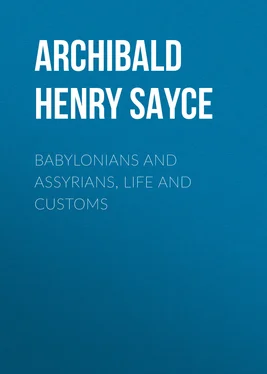Archibald Henry Sayce - Babylonians and Assyrians, Life and Customs
Здесь есть возможность читать онлайн «Archibald Henry Sayce - Babylonians and Assyrians, Life and Customs» — ознакомительный отрывок электронной книги совершенно бесплатно, а после прочтения отрывка купить полную версию. В некоторых случаях можно слушать аудио, скачать через торрент в формате fb2 и присутствует краткое содержание. Жанр: foreign_prose, История, foreign_edu, foreign_antique, на английском языке. Описание произведения, (предисловие) а так же отзывы посетителей доступны на портале библиотеки ЛибКат.
- Название:Babylonians and Assyrians, Life and Customs
- Автор:
- Жанр:
- Год:неизвестен
- ISBN:нет данных
- Рейтинг книги:5 / 5. Голосов: 1
-
Избранное:Добавить в избранное
- Отзывы:
-
Ваша оценка:
- 100
- 1
- 2
- 3
- 4
- 5
Babylonians and Assyrians, Life and Customs: краткое содержание, описание и аннотация
Предлагаем к чтению аннотацию, описание, краткое содержание или предисловие (зависит от того, что написал сам автор книги «Babylonians and Assyrians, Life and Customs»). Если вы не нашли необходимую информацию о книге — напишите в комментариях, мы постараемся отыскать её.
Babylonians and Assyrians, Life and Customs — читать онлайн ознакомительный отрывок
Ниже представлен текст книги, разбитый по страницам. Система сохранения места последней прочитанной страницы, позволяет с удобством читать онлайн бесплатно книгу «Babylonians and Assyrians, Life and Customs», без необходимости каждый раз заново искать на чём Вы остановились. Поставьте закладку, и сможете в любой момент перейти на страницу, на которой закончили чтение.
Интервал:
Закладка:
The invention of the will or documentary testament, followed naturally. The same legal powers that were required to protect a man's property during his lifetime were even more urgently required when he was dead. The will was at first the title which gave the heir his father's estate. Gradually it developed, until at last it came to be an instrument by means of which the testator retained control over his property even after his death. As an example of the form which it usually assumed, we may take one which was drawn up in the seventh year of the reign of Cyrus as King of Babylon (532 B.C.):
Nebo-baladan, the son of Samas-palassar, the son of the priest of the Sun-god, has, of his own free-will, sealed all his estate, which he had inherited from Nebo-balasu-iqbi, the son of Nur-Ea, the son of the priest of the Sun-god, the father of his mother, and from Kabtâ, the mother of Assat-Belit, his grandmother, consisting of a piece of land, a house and the slaves or serfs attached to it, in accordance with the will (literally tablet) which his maternal grandfather, Nebo-balasu-iqbi, and his maternal grandmother, Kabtâ, had sealed and bequeathed to Nebo-baladan, the son of their daughter, and has bequeathed them for ever to Samas-palassar, the son of Samas-ina-esi-edher, the son of the priest of the Sun-god. As long as Nebo-baladan lives the piece of ground, the house, the slaves, and all the rest of his property shall continue in his own possession, according to the terms of this his will. Whoever shall attempt to change them, may Anu, Bel, and Ae curse him; may Nebo, the divine scribe of Ê-Saggil, cut off his days! This will has been sealed in the presence of Sula, son of Bania, son of Epes-ilu; of Bel-iddin, son of Bel-natsir, son of the priest of Gula; of Nebo-sum-yukin, son of Sula, son of Sigua; of Nebo-natsir, son of Ziria, son of Sumâti; … of Nebo-sum-lisir, son of Nebo-sum-iskun, son of the wine-merchant (?), and the scribe Samas-zir-yusabsi, son of Zariqu-iddin, son of the architect. (Written at) Babylon, the 19th day of Sebat (February), the seventh year of Cyrus, king of Babylon and the world.
In this case it is a son who makes over his property to his father should he be the first to die. The will shows that the son was absolute master of his own possessions even during his father's lifetime, and could bequeath it as he chose.
A remarkable instance of the application of the principles underlying testamentary devolution is to be found in the case of Ninip-Sum-iskun, the son of a land-surveyor who handed over his property to his daughter Dhabtu, while he was still alive, stipulating only for the usufruct of it. The text begins by saying that the testator called to his daughter: “Bring me writing materials, for I am ill. My brother has deserted me; my son has offended me. To you therefore I turn. Have pity on me, and while I live support me with food, oil, and clothes. The income from my surveying business, in which I have two-thirds of a share with my brother, do I hand over to you.” After this preamble the deed is drawn up in due form, attested, dated, and sealed. The whole of the testator's property is assigned to his daughter “for ever,” “the usufruct of his income” only being reserved to himself “as long as he shall live.” He undertakes accordingly not to “sell” it, not to give it to another, not to pawn it or alienate a portion of it. By way of doubly securing that the deed shall take effect, the gods are invoked as well as the law. 3 3 A similar case, in which, however, it is a testatrix who hands over her property to her son during her lifetime, is recorded in a deed dated at Babylon the 10th day of Sivân, in the second year of Nabonidos. The deed is as follows: “Gugûa, the daughter of Zakir, the son of a native of Isin, has voluntarily sealed and delivered to her eldest son, Ea-zir-ibni, her dowry, consisting of one maneh which is in the keeping of Nebo-akhi-iddin, the son of Sula, the son of Egibi; 35 shekels which have been mortgaged to Tabnea, the son of Nebo-yusallim, the son of Sin-sadunu, and 20 shekels which are due from Tasmetum-ramat, the daughter of Arad-Bel, the son of Egibi, as well as a field producing 48 qas of seed on the canal of Kish. As regards the maneh and 56 shekels belonging to Gugûa, which, in the absence of her eldest son, Ea-zir-ibni, she has divided between her younger sons, Nebo-akhi-bullidh, Nergal-ina-esi-edher, Itti-Samas-baladhu, and Ninip-pir- utsur , Ea-zir-ibni shall have no claim to them. Gugûa has delivered to Ea-zir-ibni, her eldest son, one maneh, now in the hands of Nebo-akhi-iddin, 55 shekels in the hands of Tabnea, 50 shekels in the hands of Tasmetum-ramat, and a field bearing 48 qas of seed. As long as Gugûa lives, Ea-zir-ibni shall give his mother Gugûa, as interest upon the property, food and clothing. Gugûa shall alienate none of it out of affection or will it away. Ea-zir-ibni shall not be disturbed in his possession.” The names of three witnesses are attached to the deed, which was “sealed in the presence of Babâ, the daughter of Nebo-zir-lisir, the son of Egibi.”
Another case in which a kind of will seems to have been made which should take effect during the lifetime of the testator, is a document drawn up by order of the Assyrian King Sennacherib. We may gather from it that Esar-haddon, though not his eldest, was his favorite son, a fact which may explain his subsequent assassination by two of his other sons, who took advantage of their brother's absence in Armenia at the head of the army, to murder their father and usurp the throne. In the document in question Sennacherib makes a written statement of his desire to leave to Esar-haddon certain personal effects, which are enumerated by name. “Gold rings, quantities of ivory, gold cups, dishes, and necklaces, all these valuable objects in plenty, as well as three sorts of precious stones, one and one-half maneh and two and one-half shekels in weight, I bequeath to Esar-haddon, my son, who bears the surname of Assur-etil-kin-pal, to be deposited in the house of Amuk.” It will be noticed that this document is not attested by witnesses. Such attestation was dispensed with in the case of the monarch; his own name was sufficient to create a title. Whether it would have been the same in Babylonia, where the king was not equally autocratic and the commercial spirit was stronger than in Assyria, may be questioned. At all events, when Gigitu, the daughter of the Babylonian King Nergal-sharezer, was married to one of his officials, the contract was made out in the usual form, and the names of several witnesses were attached to it, while the deeds relating to the trading transactions of Belshazzar when heir-apparent to the throne differ in nothing from those required from the ordinary citizen.
Besides possessing the power of making a will, the head of the family was able to increase it by adoption. The practice of adoption was of long standing in Babylonia. The right to become King of Babylon and so to claim legitimate rule over the civilized world was conferred through adoption by the god Bel-Merodach. The claimant to sovereignty “took the hand of Bel,” as it was termed, and thereby became the adopted son of the god. Until this ceremony was performed, however much he might be a sovereign de facto , he was not so de jure . The legal title to rule could be given by Bel, and by Bel alone. As the Pharaohs of Egypt were sons of Ra the Sun-god, so it was necessary that the kings of Babylon should be the sons of the Babylonian Sun-god Merodach. Sonship alone made them legitimate.
This theory of adoption by a god must have been derived from a practice that was already well known. And the power of adopting children was exercised by the Babylonians up to the last. It has been suggested that it was due to ancestor-worship, and the desire to prevent the customary offerings from being discontinued through the extinction of the family. But for this there is no evidence. Indeed, it is questionable whether there was any worship of ancestors in Babylonia except in the case of the royal family. And even here it had its origin in the deification of the kings during their lifetime.
Читать дальшеИнтервал:
Закладка:
Похожие книги на «Babylonians and Assyrians, Life and Customs»
Представляем Вашему вниманию похожие книги на «Babylonians and Assyrians, Life and Customs» списком для выбора. Мы отобрали схожую по названию и смыслу литературу в надежде предоставить читателям больше вариантов отыскать новые, интересные, ещё непрочитанные произведения.
Обсуждение, отзывы о книге «Babylonians and Assyrians, Life and Customs» и просто собственные мнения читателей. Оставьте ваши комментарии, напишите, что Вы думаете о произведении, его смысле или главных героях. Укажите что конкретно понравилось, а что нет, и почему Вы так считаете.












